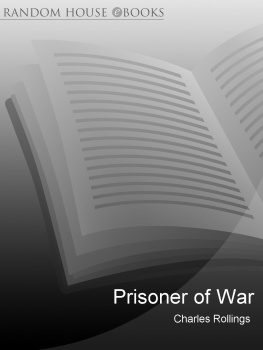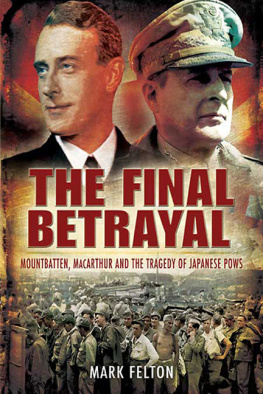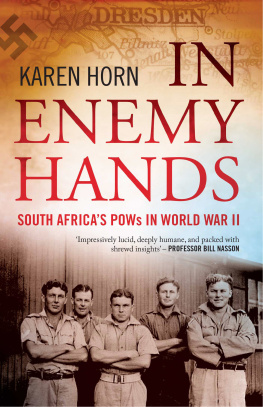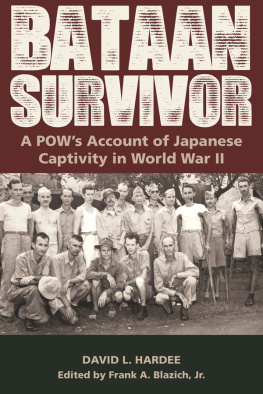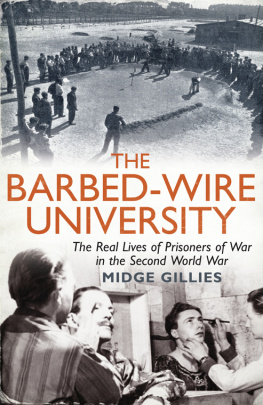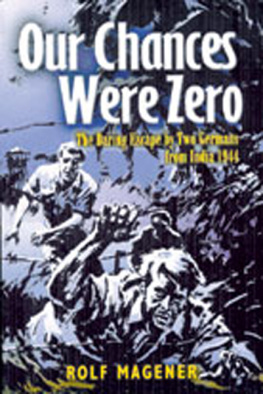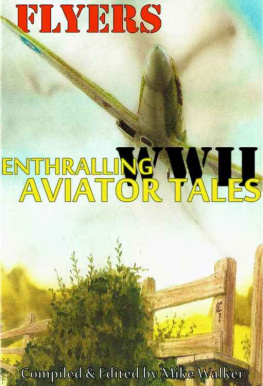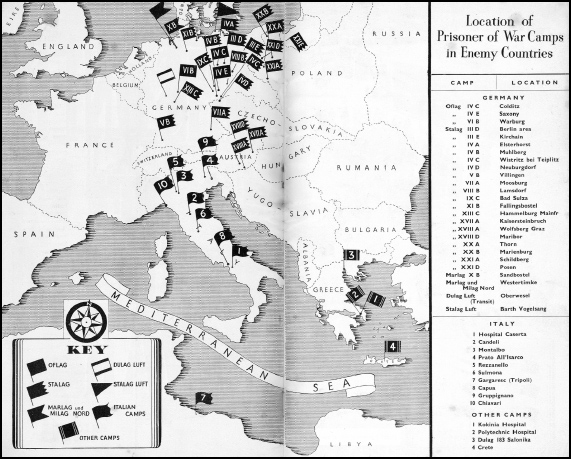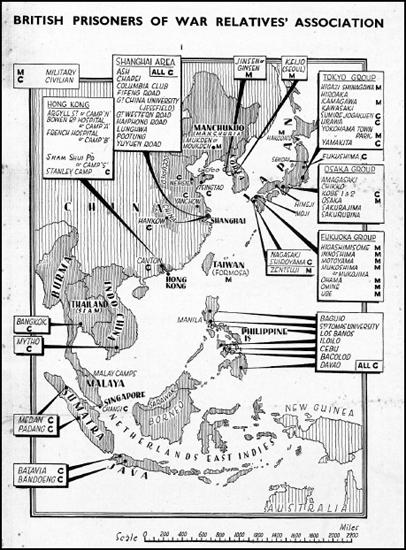Voices from Behind the Wire
in the Second World War
Charles Rollings
This eBook is copyright material and must not be copied, reproduced, transferred, distributed, leased, licensed or publicly performed or used in any way except as specifically permitted in writing by the publishers, as allowed under the terms and conditions under which it was purchased or as strictly permitted by applicable copyright law. Any unauthorised distribution or use of this text may be a direct infringement of the authors and publishers rights and those responsible may be liable in law accordingly.
Version 1.0
Epub ISBN 9781446490969
www.randomhouse.co.uk
1 3 5 7 9 10 8 6 4 2
Published in 2007 by Ebury Press, an imprint of Ebury Publishing
A Random House Group Company
This edition published 2008
Copyright Charles Rollings 2008
Charles Rollings has asserted his right to be identified as the author of this Work in accordance with the Copyright, Designs and Patents Act 1988
All rights reserved. No part of this publication may be reproduced, stored in a retrieval system, or transmitted in any form or by any means, electronic, mechanical, photocopying, recording or otherwise, without the prior permission of the copyright owner
The Random House Group Limited Reg. No. 954009
Addresses for companies within the Random House Group can be found at
www.randomhouse.co.uk
A CIP catalogue record for this book is available from the British Library
ISBN 9780091910082
To buy books by your favourite authors and register for offers visit www.rbooks.co.uk
CONTENTS
ACKNOWLEDGEMENTS
THANKS ARE DUE to the following for allowing me to reproduce material from private collections held in the Imperial War Museum, Lambeth: Adrian Abbott (Lieutenant Stephen S Abbott); Lawrence Bains (Corporal Lawrence Bains); Eric Barrington (Corporal Eric Barrington); the late Lieutenant-Colonel W M G Bompas (Lieutenant William Bompas); Lucinda Brooks (Lieutenant-Colonel Sydney Charles Fane de Salis, DSO); Mrs Jean Carpenter (Signalman John Stanley Walker); Mrs M Dalgleish (Midshipman J F Dalgleish); the family of S J Doughty; Jodi Fitzsimons (Lieutenant Dan Billany); Jane G Forsey (Lieutenant-Colonel P A Belton); Mrs Enid Innes-Ker (Sergeant W McD and Mrs Enid Innes-Ker); Miss M M King (Gunner Cyril George King); Erik Laker (Private Erik Laker); Sandra Luckett (Sapper Don Luckett); Richard Pelly (Major Sir John Pelly); Mrs John Pelly (Lieutenant John Gordon Pelly, RNVR); Celia Rambaut (Pilot Officer I P B Denton); Mrs Joan Rix (Flight Lieutenant Eric Williams); Susan Shearn (Pilot Officer E D Shearn); Mrs Audrey Sollars (Lance-Corporal Jack Sollars); Sebastian Stephens (Lieutenant-Commander W L Stephens); Mrs Dorothy Threadgold (Captain A G Threadgold); Patrick Toosey (Lieutenant-Colonel Philip Toosey); Major M S Wagner MBE (Lieutenant M S Wagner); Mrs E M White (Lieutenant H L White).
Every effort has been made by the Imperial War Museum to trace the copyright holders of the collections of the late Reverend G Bower, Mrs D B Crawford (Wendy Fleming), H E C Elliott, L E Morris, A F Powell, P Hall Romney, F H Thompson, E W Whincup and R S Young, but without success. Both the IWM and myself should appreciate any information regarding the current copyright holders so that they can be acknowledged in future editions.
I would also like to thank, very warmly, Roderick Suddaby, the Keeper of the Department of Documents at the Imperial War Museum, along with his able and attentive staff, for the assistance they have given during the past year.
I am also grateful to the following for allowing me to interview them and to use correspondence, diaries and unpublished manuscripts: H R Bewlay; Captain H H Bracken, CBE, RN (Retd); A C Bryant; the late M G Butt; Edward Cadwallader; the late N E Canton; Mrs U Cole (G F Cole); the late H D H Cooper; Nicholas Craig (Squadron Leader G D Craig); the late H E L Falkus; the late Patrick Greenhous; the late Bill Greenaway; Gertrud Koppenhfer; Mrs Vivien Johnson (T F S Johnson); the late J R Kayll; the late Hannelore Lewerentz; the late D M Lubbock and his eldest daughter Ann Pat Gooch; the late M H Roth; P G Royle; Sigrid Haase; Air Commodore D M Strong, CB, DFC RAF (Retd); Nigel Viney (Major Elliott Viney); the Public Record Office, for the escape report of the late J E T Asselin; and Duane Reed, of the USAF Academy Library, Colorado, for letters and diaries acquired from the estates of Oberst Freiherr Friedrich-Wilhelm von Lindeiner-Wildau and Major Gustav Simoleit, both of the Luftwaffe. Finally, I extend a hand to Robert Kee for kindly agreeing to write the Foreword.
For the use of drawings, photographs and maps I would like to thank: Adrian Abbott, H R Bewlay, the late Lieutenant-Colonel W M G Bompas, Mrs Jean Carpenter, Nicholas Craig, the family of S J Doughty, Jodi Fitzsimons, Sigrid Haase, Enid Innes-Ker, Mrs John G Pelly, Mrs Joan Rix, Julie Summers, Mrs Dorothy Threadgold, the Toosey family, Mrs E M White, the Imperial War Museum and the British Red Cross Society.
I tender apologies in advance to any contributor I may have inadvertently overlooked, and to those whom I was unable to contact, despite all reasonable efforts, for leave to use their material. Among the latter are Charles and Elsie Bryant, Harry Crease, Maurice Driver, Ted Eames, Kurt Knierim, Gertrude Koppenhfer, Hannelore Lewerentz, Jack Lyon, C J Lythgoe, Gisela Moody, Mrs Pam Milligan, Spenser Mulligan, Harry Swann and Harry Train. All have my gratitude nonetheless.
Finally, I thank my wife, Isabel; my agent, Charlie Viney; and my editors at Ebury for their encouragement and support.
FOREWORD
TO HAVE BEEN taken a prisoner of war in the Second World War can evoke in those who were not themselves prisoners a personal sympathy which, to someone like myself who spent some three years in Stalag Luft III and other German camps, can sometimes seem rather overdone though not of course in cases where people had been prisoners of the Japanese.
Yes, in German camps there was occasional anxiety over food, but Red Cross Parcels on the whole dealt more or less reliably with that; and, yes, there was boredom and occasional lonely wondering about when indeed the War was likely to end. But we had our secret radio, conjured skilfully by bribing some of the German guards and capable of receiving the BBC news. Quite apart from that there was the openness of the camp site, which allowed relatively as much physical exercise as one felt inclined for, including occasional cricket matches. Apart from that there was a theatre provided by the Germans in the camp which we prisoners could use as we wished, either for lectures on subjects on which fellow prisoners were so often extremely well informed, or for public readings, but also for the performance of plays well selected by prisoners with theatrical experience from former everyday life Shakespeares

